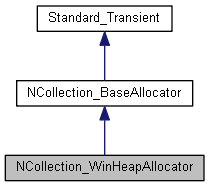This memory allocator creates dedicated heap for allocations. This technics available only on Windows platform (no alternative on Unix systems). It may be used to take control over memory fragmentation because on destruction ALL allocated memory will be released to the system. More...
#include <NCollection_WinHeapAllocator.hxx>

Public Member Functions | |
| NCollection_WinHeapAllocator (const size_t theInitSizeBytes=0x80000) | |
| Main constructor. | |
| virtual | ~NCollection_WinHeapAllocator () |
| Destructor. | |
| virtual void * | Allocate (const Standard_Size theSize) override |
| Allocate memory. | |
| void * | AllocateOptimal (const Standard_Size theSize) override |
| Allocate memory. | |
| virtual void | Free (void *theAddress) override |
| Release memory. | |
 Public Member Functions inherited from Standard_Transient Public Member Functions inherited from Standard_Transient | |
| Standard_Transient () | |
| Empty constructor. | |
| Standard_Transient (const Standard_Transient &) | |
| Copy constructor – does nothing. | |
| Standard_Transient & | operator= (const Standard_Transient &) |
| Assignment operator, needed to avoid copying reference counter. | |
| virtual | ~Standard_Transient () |
| Destructor must be virtual. | |
| virtual const opencascade::handle< Standard_Type > & | DynamicType () const |
| Returns a type descriptor about this object. | |
| Standard_Boolean | IsInstance (const opencascade::handle< Standard_Type > &theType) const |
| Returns a true value if this is an instance of Type. | |
| Standard_Boolean | IsInstance (const Standard_CString theTypeName) const |
| Returns a true value if this is an instance of TypeName. | |
| Standard_Boolean | IsKind (const opencascade::handle< Standard_Type > &theType) const |
| Returns true if this is an instance of Type or an instance of any class that inherits from Type. Note that multiple inheritance is not supported by OCCT RTTI mechanism. | |
| Standard_Boolean | IsKind (const Standard_CString theTypeName) const |
| Returns true if this is an instance of TypeName or an instance of any class that inherits from TypeName. Note that multiple inheritance is not supported by OCCT RTTI mechanism. | |
| Standard_Transient * | This () const |
| Returns non-const pointer to this object (like const_cast). For protection against creating handle to objects allocated in stack or call from constructor, it will raise exception Standard_ProgramError if reference counter is zero. | |
| Standard_Integer | GetRefCount () const noexcept |
| Get the reference counter of this object. | |
| void | IncrementRefCounter () noexcept |
| Increments the reference counter of this object. | |
| Standard_Integer | DecrementRefCounter () noexcept |
| Decrements the reference counter of this object; returns the decremented value. | |
| virtual void | Delete () const |
| Memory deallocator for transient classes. | |
Additional Inherited Members | |
| typedef void | base_type |
| Returns a type descriptor about this object. | |
 Static Public Member Functions inherited from NCollection_BaseAllocator Static Public Member Functions inherited from NCollection_BaseAllocator | |
| static const Handle< NCollection_BaseAllocator > & | CommonBaseAllocator (void) |
| CommonBaseAllocator This method is designed to have the only one BaseAllocator (to avoid useless copying of collections). However one can use operator new to create more BaseAllocators, but it is injurious. | |
| static constexpr const char * | get_type_name () |
| Returns a type descriptor about this object. | |
| static const opencascade::handle< Standard_Type > & | get_type_descriptor () |
| Returns type descriptor of Standard_Transient class. | |
 Protected Member Functions inherited from NCollection_BaseAllocator Protected Member Functions inherited from NCollection_BaseAllocator | |
| NCollection_BaseAllocator () | |
| Constructor - prohibited. | |
This memory allocator creates dedicated heap for allocations. This technics available only on Windows platform (no alternative on Unix systems). It may be used to take control over memory fragmentation because on destruction ALL allocated memory will be released to the system.
This allocator can also be created per each working thread however its real multi-threading performance is dubious.
Notice that this also means that existing pointers will be broken and you should control that allocator is alive along all objects allocated with him.
| NCollection_WinHeapAllocator::NCollection_WinHeapAllocator | ( | const size_t | theInitSizeBytes = 0x80000 | ) |
Main constructor.
|
virtual |
Destructor.
|
overridevirtual |
Allocate memory.
Reimplemented from NCollection_BaseAllocator.
|
inlineoverridevirtual |
Allocate memory.
Reimplemented from NCollection_BaseAllocator.
|
overridevirtual |
Release memory.
Reimplemented from NCollection_BaseAllocator.